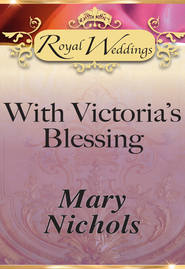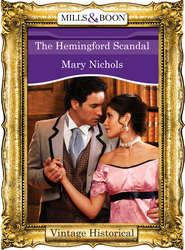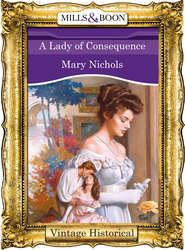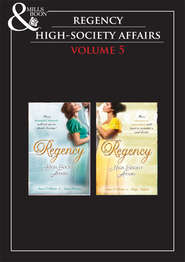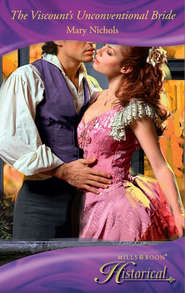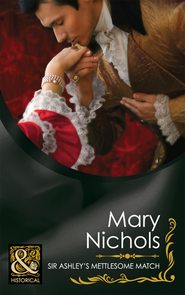По всем вопросам обращайтесь на: info@litportal.ru
(©) 2003-2024.
✖
A Desirable Husband
Настройки чтения
Размер шрифта
Высота строк
Поля
Rowan agreed that it was impossible for Esme to go out and about in Lucy’s cast-off clothes, which very nearly started Myles off on another argument, but he wisely held his peace. The carriage was put at Rosemary’s disposal for the next morning so that she could take her sister shopping and Rowan readily agreed to foot the bill for the new wardrobe.
When they dispersed to go to their beds, Esme contrived to walk a little way with Myles. ‘I am so sorry,’ she whispered. ‘It was not my idea to buy new clothes and I would not for the world have Lucy think ill of me.’
‘I am sure she would understand.’ He grinned. ‘And it will be grand to have a new wardrobe, won’t it?’
‘Yes, as long as I am not put into frills and flounces. I hate them.’
The shopping expedition was not a leisurely affair; Rosemary knew exactly what was wanted and was determined Esme should be a credit to her good taste. In every shop they entered the assistants hurried forward to serve her, though Esme would have liked a little more time to browse and view what was on offer, she was obliged to admit that Rosemary’s choice was excellent and flounces, frills and bows were kept to a minimum. ‘You have a very good figure,’ Rosemary told her. ‘Simple clothes will show it off to advantage.’ The material and pattern of the gown she would wear for her curtsy to the Queen took the longest to be decided upon and was to be made up by Madame Devereux, Rosemary’s own dressmaker. The bodice of the dress had to be low cut and the skirt very full with a long train. Accessories like slippers, fan, jewellery and feathers had to be chosen with care to conform to the rigid rules laid down by protocol.
By the middle of the afternoon, they were on their way back to Trent House with the carriage loaded down with purchases and more to be delivered in the coming days. Shopping with her mother in Leicester and Peterborough was never like this. There, it would be an all-day affair with her mother complaining of the lack of choice and the high prices and wondering aloud what her father would say when presented with the bill, though it never stopped her buying something she wanted. Rosemary had never once mentioned the price of anything.
They turned from Oxford Street, where Rosemary had purchased some lengths of ribbon, into the northern end of Park Lane. Esme glimpsed green grass through the trees and longed to go for a walk. At home in Luffenham she walked or rode everywhere and already she was missing her daily exercise. ‘Is that Hyde Park, Rosie?’ she asked.
‘Yes.’
‘Is it possible to walk home through it?’
‘Yes, perfectly possible.’
‘Then do let’s walk. Banny can take the coach home and put the shopping away.’
‘We have to go to Lady Aviemore’s to tea.’ Her ladyship was, according to Rosemary, a notable hostess and knew everyone of any importance and she could—if she took to Esme—be influential in introducing her to other young people, among whom might be a suitable husband. She would know the history behind every one of them. Who could safely be cultivated and who best to avoid. ‘Once you are out, she can help us get you seen and noticed,’ Rosemary had told her sister. ‘So it is important you make the right impression.’
‘That is hours away. Come on, Rosie, I want to explore.’
‘Very well.’ Rosemary asked the driver to stop and they left the coach and entered the park by Brook Gate and were soon strolling along one of the many walks towards the Serpentine.
In spite of the fact that London was, according to Rosemary, quite empty, they met several people she knew and they stopped to chat. Esme was presented to them and exchanged the usual pleasantries, but she was not particularly interested in what they had to say and her attention wandered to her surroundings. The park, once on the outskirts but now in the heart of London, was an oasis of green. There was a wide tree-lined carriageway and several paths for pedestrians and the famous Rotten Row where horsemen and women showed off their mounts. Her curiosity was aroused by a slim young man in a single-breasted green riding coat and biscuit-coloured riding breeches, who was very deliberately pacing the ground and making notes on a pad he was carrying. Every now and then he looked up at a group of elms that graced that corner of the park and appeared to be sizing them up and drawing them. She took a step closer to see what he was about.
He must have sensed her presence because he suddenly turned and looked straight at her. She found herself catching her breath because he was the most handsome man she had ever seen in her life. His eyes, she noted, were greenish brown and they were laughing, not at her, she was sure of that, but in a kind of amused empathy, as if he understood her curiosity and was not in the least put off by it. His hair, beneath a brown beaver hat, was a little darker than gold and curled into his neck. His hands, holding his notepad and pencil, were lean like the rest of him, the fingers tapered. An artist, she decided. He smiled at her, put his finger to the brim of his hat and tilted it towards her. Her answering smile lit her face as if she had suddenly met someone she had known long ago and hadn’t seen for a while.
‘Esme, who is that?’ Rosemary had said goodbye to her friends and turned to see her sister apparently on nodding terms with a young man.
‘I’ve no idea. I’ve never seen him before, but he’s handsome, isn’t he?’
‘Esme, how could you?’
‘Could I what?’
‘Smile in that familiar way at a man to whom you have not been introduced.’
‘But he smiled first and—’
‘Then he cannot be a real gentleman. It is the lady’s prerogative to acknowledge a gentleman when she is out and until she does so, it behoves a gentleman to show no sign of recognition. You should have ignored him.’
‘Would that not have been impolite?’
‘Not at all. Now come away before he decides to approach us, for I should feel mortified to have to speak to him.’ She took Esme’s arm and almost dragged her away.
Esme looked back over her shoulder and discovered the young man was staring after them, which made her giggle.
‘Esme!’ Rosemary reprimanded her. ‘I see I shall have to take you to task about what is and what is not acceptable behaviour. You do not smile at strange men. Goodness, it is asking for them to take liberties.’
‘What liberties?’ Esme asked. ‘Do you mean kissing me?’
‘Good heavens, I hope not. I mean speaking to you without an introduction.’
‘Oh, that.’ Esme was dismissive.
Rosemary’s reply to that was a decided sniff.
Felix watched them go, wanting to laugh aloud. The young lady, who was very lovely with her rosebud complexion and neat figure, was evidently being given a scolding, but it did not seem to be subduing her. He wondered who she was. Was she one of those young ladies who came to London for a Season with the express purpose of snaring a husband? It was early in the year for that and she seemed a little young to be tying herself down to marriage.
His mother might not agree; she had been urging him ever since he returned from France without Juliette to find himself a bride. ‘Someone young and malleable,’ she had said. ‘Then you can mould her to your way of doing things. Besides, a young bride is more likely to produce healthy offspring.’ He smiled to himself; this particular young lady did not look as if she were especially malleable, not that he would want a wife who dare not say boo to a goose. He pulled himself up short. How could the sight of a pretty girl make his thoughts suddenly turn to marriage. He wasn’t ready for that yet; time, the healer, had yet to do its work.
He was not a hermit by any means. To please his mother, he had attended tea parties and dances in the assembly rooms in his home town of Birmingham, taken tea with the matrons and danced with their daughters, making superficial conversation, even flirting a little, but, as his mother was quick to point out, that could hardly be called a serious pursuit of a bride. He supposed he would have to marry one day, but he never felt less like falling in love again and it would be unfair on any young lady to use her simply to beget an heir and have an elegant companion, if she were expecting a husband to love her. It would be better to choose someone more mature than the young miss with the friendly smile, someone worldly wise who wouldn’t expect declarations of eternal love, but would be content with wealth and position.
He smiled ruefully to himself; whatever had set his thoughts on marriage had better be stifled. If this idea of a great exhibition came about, he would be too busy to think of anything else. He looked down at the pad in his hand. There was a series of measurements and a rough sketch of the elm trees, which were going to be a stumbling block to any good design. The Exhibition building committee were working on a design but he thought it was ugly, and it took no account of the trees, assuming they would have to be felled. Even the committee was dissatisfied with it and an idea was being mooted for a competition to design the building and he thought he might enter it.
His pencil moved over the pad, roughing out the plan of a building with an open central courtyard to accommodate the elms and then for no reason that he could fathom, added people to his drawing: the urchin bowling a hoop, a man on a horse, a carriage on the drive, the cake-and-fruit stall beside the water and the two ladies he had just seen. He laughed at himself for his fancifulness. Pulling his watch from waistcoat pocket, he was startled to discover it was already four-thirty; his valet would be dancing up and down in impatience. He hurried to where he had tethered his horse and cantered off in the direction of Hyde Park Corner and his house in Bruton Street.
‘Rosie, could we not go and see the guests arriving for the banquet?’ Esme asked when they were on their way home in the carriage after Lady Aviemore’s tea party. Esme had expected the company to be mixed, but they had all been ladies, some young, some older, who spent the time between sipping tea and nibbling wafer-thin sandwiches, in exchanging gossip, some of it shockingly malicious, but the outcome was several invitations to soirées and musical evenings and little dances.
‘It is too early in the year for balls,’ her ladyship had said. ‘But I intend to hold one as soon as the town begins to fill up. Lord Aviemore is on the committee dedicated to raising funds for the Exhibition and we thought a subscription ball would be just the thing. Very exclusive, of course. You will come, dear Lady Trent, won’t you, and bring your delightful sister?’
Rosemary declared she would be delighted, which surprised Esme, considering Rowan’s implacable opposition to the project, but a look from her sister stopped her making any comment.
‘Lord Aviemore is to attend tonight’s banquet,’ her ladyship continued. ‘It is being held to encourage the towns in the provinces to raise funds. After all, it is a countrywide endeavour, not just for the capital.’
‘I thought it was an international project involving the whole world,’ Esme put in.
Lady Aviemore looked sharply at her as if surprised to hear her daring to take part in the conversation. ‘Indeed it is,’ she said. ‘But it is the idea of our own dear Prince and it is this country which will organise and build it.’
‘I believe the banquet is to be a very grand affair,’ one of the other ladies put in. ‘I intend to go past the Mansion House on my way home to see the guests arrive.’
It was that which had prompted Esme’s question. Ever since she had returned from her walk in the park, she had felt unsettled, as if she were waiting for something extraordinary to happen, though she had no idea what it might be. The tea party had done nothing to dispel it. They had no engagement for the evening and, as both Rowan and Myles were to be out and they only had themselves to please, she could not see that a little diversion would do any harm. Myles was off to the banquet at the Mansion House and Rowan was going to have dinner with Lord Brougham, a former Lord Chancellor, who was one of the prominent figures working to scotch the idea of an exhibition. She smiled to herself in the darkening interior of the carriage, wondering if Myles and Rowan had encountered each other on their way out and, if they had, what they had said.
‘Whatever for?’ Rosemary demanded.
‘It will be such fun to see all the coaches and carriages arriving and the guests dressed in their finery. I should like to be able to tell Mama and Papa I had seen Prince Albert. Oh, do tell the coachman to take us that way.’
Esme could see she was tempted to see the spectacle herself, though she still hesitated. ‘What Rowan would say I cannot think.’
‘Why should he say anything? You do not have to tell him.’
‘Goodness, Esme, I would never deceive him or keep anything from him, and I sincerely hope that when you are married, you will be completely honest and open with your husband.’
‘I am sure he would not begrudge me a sight of the Queen’s consort arriving for a banquet.’ She did not add that if he did, she would have made a terrible mistake in her choice of husband. She was beginning to think this idea of deliberately setting out to find a husband was full of pitfalls and she must be on her guard. ‘Go on, Rosie, it won’t take long, will it? There is no one waiting for us at home.’






